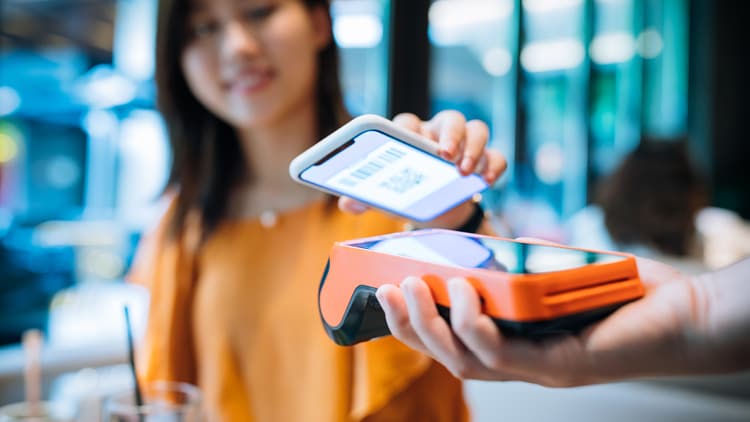79% of Irish consumers have changed non-essential spending in the last six months - says PwC latest Irish Consumer Insights Pulse Survey
06 March, 2023
Almost all Irish consumers will adopt cost saving behaviours over the next six months.
In-store experience is critical with 55% identifying knowledgeable and helpful sales assistants as the most appealing store shopping attribute.
Around a quarter of Irish consumers will increase their online (27%) and in-store shopping (23%) over the next six months.
Consumers are increasingly conscious of data privacy as they shop online - 38% rarely / never purchase from online websites as a result of data privacy concerns.
Only 14% of Irish consumers have used the Metaverse platform for entertainment, virtual experiences or purchasing products in the last six months, lower than global counterparts (26%).

Almost half (45%) of Irish consumers report that they are extremely (19%) or very concerned (26%) about their personal financial situation. Over three-quarters (79%) said that they have changed their non-essential spending, including 15% who have stopped non-essential spending altogether.
74% of Irish consumers (Global: 56%) said that rising prices has been the most frequently experienced issue over the last three months when shopping in-store (Online Irish shoppers: 63%; Online global shoppers: 48%). A nod to a return to more normal activities, around half plan to take an international flight (45%), stay in a hotel (52%) and take a staycation (44%) in the next few months. This is according to the 2023 PwC Irish Consumer Insights Pulse Survey, which captured the views of 523 Irish consumers alongside 9,180 global consumers across 25 countries, published today. This press release deals with the Irish results.
2022 saw the re-appearance of inflation after decades of very low levels. As a result, Irish consumers are cautious and mindful of cost and value. The survey reveals expected spending increases over the next few months to be less than last year, for example: home improvement (2023: 26%; 2022: 34%), travel (2023: 25%; 2022: 52%), fashion (2023: 18%; 2022: 32%), home entertainment (2023: 14%; 2022: 21%), health and beauty (2023: 14%; 2022: 27%) and luxury/designer goods (2023: 9%; 2023: 19%). At the same time, nearly half (47%) expect to increase spending on grocery.
Shifting consumer habits to tackle cost of living challenges
Consumers are shifting their consumption habits in-store and online as a result of the cost-of-living challenges and supply chain disruptions. 98% of Irish consumers will adopt cost-saving behaviours over the next six months (Global: 90%). It’s all about value, for example, six out of ten (60%) Irish consumers intend to buy retailers’ own brand products (Global: 32%); 59% intend to shop with retailers offering better value (Global: 46%); 55% will buy certain products only when they are on promotion or special offer (Global: 49%) and 53% will switch to a cheaper brand (Global: 37%).
John Dillon, Leader, PwC Ireland Retail & Consumer Practice, said: “2022 was a challenging year for consumers with growing inflation, higher fuel bills and rising interest rates. The new research highlights a heightened level of concern across Irish consumers. They are also very clear about the actions they will take to manage their budgets.”
“For retailers to thrive in this challenging environment and maintain consumer engagement, they must remain focused on delivering value to the consumer, invest in the in-store store customer experience and ensure their omni-channel propositions deliver a frictionless customer centric experience.”
The world of work
In this survey, as in the previous one, we asked consumers about their ways of working. 33% of respondents are able to work in a hybrid environment, getting the opportunity to split the working week between home and the office (36% globally). 61% are required to be physically in their place of work, up from 57% in the last survey and 6% work from home all of the time (down from 8% previously). Increased numbers in the physical workplace is good for local businesses as it drives footfall into both retail and foodservice establishments. However, the trend of many office workers still not being present during the middle part of the week continues to create challenges for the sector in terms of business and labour planning.
Sustainable products are in-demand from consumers
Despite many Irish consumers not feeling confident about their personal financial situation, they are still willing to pay a higher than average price for sustainable product types. Overwhelmingly, 77% are willing to pay a higher than average price for a product that is produced/sourced locally; made from recycled, sustainable or eco-friendly materials (73%), produced by a company with a reputation for ethical practices (72%) or has a traceable and transparent origin (70%).
In-store remains most popular shopping channel
Similar to global trends, in-store shopping has remained the most popular shopping channel in Ireland - 47% of Irish consumers shopped in-store weekly or daily over the last year (Global: 43%). Over half (54%) prefer to check the product is not faulty/the correct item; a similar proportion (51%) said that they enjoy shopping in-store having missed doing so during the lockdowns. The most appealing in-store attributes are the ability to use self checkout (55%), knowledgeable and helpful sales assistants (55%) and click and collect services (42%). Nearly a quarter (23%) reported that they will increase their in-store shopping over the next six months (Global: 23%).
22% of Irish consumers shopped weekly or daily via mobiles/smartphones over the last year (Global: 34%). Only 5% of Irish consumers shopped via smart home voice assistance compared to 13% globally. Over a quarter (27%) of Irish consumers reported that they will increase their online shopping over the next six months, this is significantly below global peers (43%).
Data privacy concerns loom large for online shoppers
At the same time, consumers are increasingly conscious of data privacy as they shop online. Almost half of Irish consumers report that they are extremely or very concerned about their personal data privacy when interacting with social media websites (47%) and media companies (35%). With retailers (24%) scoring more favourably, it may indicate that they perform comparatively better than social media platforms because the return for consumers on providing data is clearer and more transparent, in the form of vouchers, discounts and special offers.
With half (52%) of Irish respondents saying that they don’t share any more personal data than they have to; 38% rarely / never purchasing from online websites and 32% rejecting options when presented with data privacy terms, there is a significant opportunity for businesses to create real value for their customers who are prepared to share their data and, in turn, build trust.
Metaverse on the rise, but Ireland lags global peers
Of all countries surveyed, Irish consumers are the third most unlikely to participate in Metaverse-related activities. 60% have heard of the Metaverse, but have never used it. The Metaverse as a shopping channel is still in its early stages of adoption - only 14% of Irish consumers have used the platform for entertainment, virtual experiences or purchasing products in the last six months (Global: 26%). The largest portion of these Irish users have primarily used the Metaverse for virtual reality (VR), i.e. gaming (Ireland: 4%; Global: 10%), joining a virtual world, i.e, experience a retail environment or concert (Ireland: 3%; Global: 9%) or purchasing a digital product, such as a Non-Fungible Token, or NFT (Ireland: 3%; Global: 9%). Globally, countries including India (48%), Vietnam (43%) and Hong Kong (42%), and demographics including Millennials (36%), are the most likely to engage in metaverse-related activities.
Owen McFeely, Director, PwC Ireland Retail & Consumer Practice, concluded: “Over one in ten (14%) Irish and one in four (26%) global consumers told us that they used the Metaverse in the last six months. Although the take-up is slower in Ireland, this indicates that the technology is becoming a more prominent part of the consumer experience.”
“Although still very much an emerging digital platform in Ireland, the Metaverse represents a significant opportunity for business transformation, particularly as a way to extend the shopping experience before and after a purchase takes place. It is also a great way to enhance the engagement with younger generations such as Gen Z customers which are looking for more engaging and community connected experiences. At the same time, consumers are increasingly cautious about their data privacy, so retailers must ensure that they are reflecting consumer attitudes in their immersive experiences if they are to see growth in online consumption.”
About the data
PwC surveyed 9,180 global consumers including 523 Irish consumers in late 2022 via a 15-minute online quantitative survey. Interviews were conducted with consumers in twenty-five participating territories around the world including Ireland. The last survey was carried out in March 2022.
About PwC
At PwC, our purpose is to build trust in society and solve important problems. We're a network of firms in 152 countries with over 328,000 people who are committed to delivering quality in assurance, advisory and tax services. Find out more and tell us what matters to you by visiting us at pwc.com.
PwC refers to the PwC network or one or more of its member firms or both, each of which is a separate legal entity. Please see pwc.com/structure for further details.
© 2023 PwC. All rights reserved







Menu